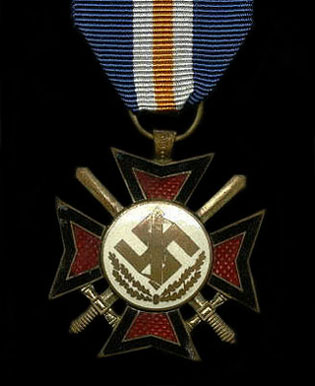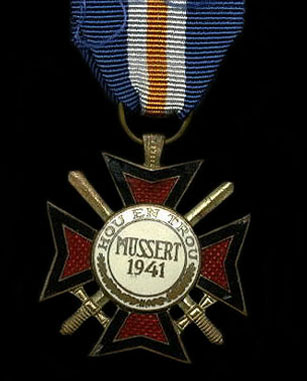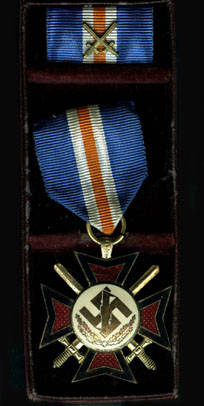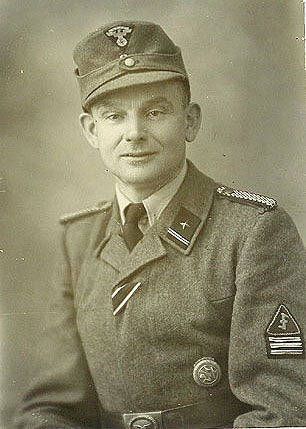Dutch
Legion Awards
|
Dutch
NSB Awards
The
Dutch NSB Party under Anton Mussert produced and issued many awards to
legion volunteers and party members.
|
|

Dutch
W.A. 1934 March
The Dutch
W.A. 1934 Honor Award

 In November 1942 the tenth anniversary of its formation, Mussert instituted a "Strijdersteken der
W.A." literally "Fighters Badge".
The medal was first awarded on 10 January 1943 in Utrecht to former members of the W.A. from the period 7 January 1933 until its dissolution on 26 December 1935. The W.A. was revived after the start of the occupation in 1940.
In November 1942 the tenth anniversary of its formation, Mussert instituted a "Strijdersteken der
W.A." literally "Fighters Badge".
The medal was first awarded on 10 January 1943 in Utrecht to former members of the W.A. from the period 7 January 1933 until its dissolution on 26 December 1935. The W.A. was revived after the start of the occupation in 1940.
In July 1935 it was stated by an NSB official the W.A. counted 1200 trained members, it is estimated that no more then 1500 Dutch honor medals were made.
The medal comprises of a round bronze medal measuring 36 mm in diameter. The obverse shows the "Wolf hook" symbol of the W.A. within a wreath of oak leaves. The reverse has the wording, "Alles voor het Vaderland" all for the Fatherland the motto of the W.A. and the dates 1932 - 1935. It hangs from a red ribbon with black stripes.
|
|


The
Mussert Bravery Cross
The Dutch Nazi Party "NSB" under the leadership of Anton Mussert
instituted a special award for NSB members in German service.
This Dutch made award commonly known as the "Mussertkruis" (Mussert
Cross). The "NSB" political party referred the award as the
"Oostlanderskruis" and it was most likely equivalent of the German Eastern Front
Medal, it was not as previously thought as a bravery award.
It comes in two classes; with swords for combatants and without swords (very rare) for
non-combatants. The cross is made of three parts from enamel and high quality gilt
finished metal. The outside edge of the cross is in black enamel on both sides with
inner portion finished in translucent red. A separate white disc is soldered to the
front and back of the cross. The front side shows gilt wolf hook over swastika with
oak leaves. The back side shows around the top edge of the circle the motto of the
NSB in gilt "Hou En Trou" and oak leaves on the bottom edge. The center of the disc
has the name "MUSSERT and date 1941." The ribbon shows the Dutch National Colors.
The ribbon colors are sky blue, white with thin orange strip to
the center, white and sky blue. The award came in a two piece maroon outer card
case. The award was probably worn eventhough it was not authorized to be worn on German uniform.


Above is a nice rare example
of the Mussert Cross, ribbon bar and case. The award and ribbon bar are placed in a cardboard
case of maroon color with golden stripes. The interior is covered in bergundy velvet.
According to some sources the medal was manufactured by the National Mint in Utrecht.
|
 Mussert Memorial
Plaque
Mussert Memorial
Plaque
The "Mussert plaquette"
(Mussert Plaque), also referred as "Eastern Front" Plaque, were issued to family members to
commemorate or honor those volunteers who fell in action on the Eastern Front. There is
a possibility that these plaques were presented with a certificate.
The plaques were etched on a plain surface made of zinc. The size is approx. 67mm
by 41mm. These plaques were presented in a plain, black cardboard box lined with purple velvet.
These plaques are very rare and only less than 20 are found in collections.
|
 W.A. Military
Sports Badge
W.A. Military
Sports Badge
The "Weer
Afdeelingen" (Defense Sections) were the Storm troopers of the NSB. Military
sporting events were held for W.A. troops and successful winners were awarded
with the military sport badge. The sport badge shows in the background a Laurel
with the NSB emblem "wolf hook" in front. The reverse is hollow with two small
loop rings that holds the pin. This die stamped badge was awarded in two classes-
silver and bronze gilt. Badge shown above is Gilt class. The badge is very large it
measures 53mm in diameter. It was instituted on 13 September 1941.
|
|
The
Dutch NSKK Honor Badge


New information has surface in regards to Dutch volunteers who served in the "NSKK" German Motorized Transport service. It was to be bestowed upon those persons who showed exceptional service in the Motor W.A. The volunteers in the Dutch NSKK could also be awarded the honour badge if they showed great Courage, Loyalty and Fidelity. It was made in three classes: Bronze, Silver and Gold.
The inspector of the Motor W.A, Banleader Eman, made the decisions on who was to be awarded one of the classes, but only after consulting the leading liaison officer at the NSKK-Gruppe Luftwaffe. The rendering of the badge took place twice a year in the case of the bronze: on the 11th of May and the 9th of November. In between these dates a person could only be awarded one of the badges in very particular cases and in exceptional circumstances. For example in the case of the silver class, Banleader Eman decided that this grade was only to be awarded in very exceptional cases hence the rarity of the badge.
The badge is die struck and is made of an alloy composed of bronze-copper. In the
front center it shows the Dutch party emblem "wolf-hook" with a German helmet on
the left side and a sword facing down on the right side. On the background it shows a transport tire with an inscription "TROUW" (Loyalty) on top. The hollow
back shows a Belgium style "C" catch and thin Belgium style pin. The badge measures 46.8mm x 51.2mm.
Also recent information has surface thanks to my Dutch colleague
Alex Dekker
who is currently writing a book on Dutch Volunteers and has kindly provided the following information taken from his book. According to the Dutch published NSKK-paper
'Alles sal reg kom 1e jaargang, extra nummer November 1943'
the following qualifications for the bronze class are:
1. For those who served in the winter of 1941-1942, from November continuously for 6 months in Russia. The persons that were also entitled to the German "Winterschlacht" (Eastern Front) medal.
2. The men who were wounded during service in the battle for Milorowo, wearers of the German "Verwundetenabzeichen" (wounded badge).
3.The men who applied voluntary for "wachtkommando" (Guard-Duties) in Makajewka.
The Loyalty badge in Silver was to be awarded only in Christmas. The names of the persons who were considered for the award were submitted for approval to the Dutch liaison Staff.
The Gold class seems not to have been awarded, however, the criteria for this grade are not known.
Those who think that they deserve the medal, should apply at the staff offices located in Brussels, Belgium and Utrecht, Holland.
Miloworo and Makajewka were key-cities during siege for Stalingrad and in both these cities the NSKK had to provide ammunition and food for the 6th Army (which was supplied by air) and the armies who had to break open the Kessel.
Two questions remain: what the qualifications were for the silver badge and for the gold badge. If anybody has information relating to this please let me know?
It should be noted that good reproductions of this badge have surface, they are cast and have different attaching hardware shown on the reverse.
|
|
Dutch NSKK Insignia

Illustrated above is a Dutch arm shield and headgear that is normally associated to
the "Weer Afdeelingen (W.A.)" storm troopers of the N.S.B. However, this
insignia with the gold embroidered wolf hook and border was also issued and
worn by Dutch NSKK volunteers whether they were ex-N.S.B. members or not.

Never before seen interesting picture showing a Dutch NSKK volunteer wearing the rare NSKK
Honor Badge from the collection of Dian Notebaert.
Most of the Dutch NSKK volunteers came under the control of the German Luftwaffe.
The Dutch NSKK saw active service in the Eastern Front as the "NSKK Regiment Niederlande."According to Littlejohn's book, volume 2 of Foreign Legions of the Third Reich; Dutch NSKK troops took more then a thousand Russian prisoners and were awarded with twenty five Iron Crosses.
It interesting to note that several hundred Dutch NSKK men fought under the German 6th Army at Stalingrad. These men were attached to the "NSKK Transportgruppe Luftwaffe/2.Brig/2.Bat./6.Regiment."
Only 50 came out of the Kessel and it is believe that all were decorated with the NSKK badge.
|
|
Eastern Front Award Document to Dutch SS Volunteer

Very rare Eastern Medal Award document given to a Dutch volunteer assigned to
the Pz-Gren, Regiment General Seyffardt of the 4th SS Panzer-Grenadier Brigade "Nederland"
from the collection of Mr. Rene van der Toorn.
During the summer of 1942 when this award was rendered to the recipient, the 4th SS Pz-Gren Brigade was being refitted in Germany.
|
[ Front
Page] [Top ][Previous
Page ] [Next Page]
|












